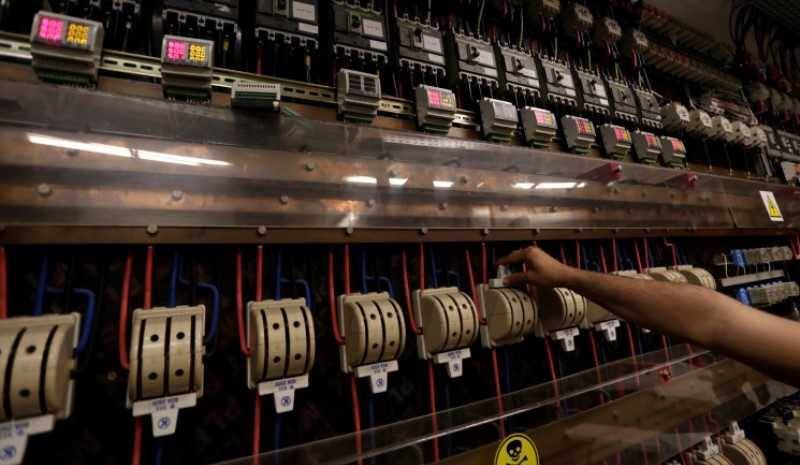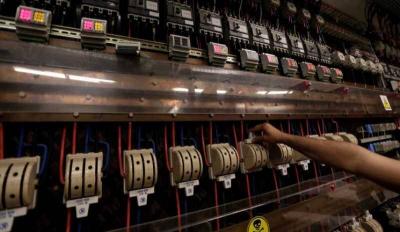12,568 Lebanese pounds per kilowatt/hour is the rate set by the Ministry of Energy and Water for private generators for May in areas below 700 meters in elevation. Meanwhile, the Union of Municipalities in Southern Beirut has set the rate for a 5 amp subscription at 7568 LBP and 3748 LBP for a 2.5 amp subscription. The fixed fee for a 5 amp capacity is 100,000 LBP, and 220,000 LBP for a 10 amp capacity.
This is the Ministry of Energy and Water’s rate for meters and the subscription price for the Southern Beirut Municipalities for the monthly cut-off. However, the rates imposed by generator owners not only ignore these defined rates and state decisions but also disregard all ethical standards, forming what we know as "mafias" that threaten people with either paying according to their greedy pricing or experiencing darkness. According to "Al-Diyar," the kilowatt rate reached between 20,000 and 23,000 LBP in some areas of Southern Beirut. For the monthly subscription cut-off, the rates in certain subscriptions are as follows:
- Airport Bridge Area, 5 amps: 90 dollars, and 2.5 amps: 45 dollars, with prices between 15,000 and 20,000 LBP per kilowatt.
- Lilac Area, 5 amps: 3 million LBP, and 2.5 amps: 1 million and 400 thousand LBP, with prices between 20,000 and 22,000 LBP per kilowatt.
- Iozai Area, 5 amps: 4 million LBP, 2.5 amps: 2 million LBP, and prices between 20,000 and 23,000 LBP per kilowatt.
Additionally, the majority of these generators do not adhere to the fixed subscription fees, which we mentioned as 100,000 LBP for 5 amps and 220,000 LBP for 10 amps, or they demand payment in dollars. Recently, one generator owner in the Iozai area forced subscribers to pay their entire bill in dollars, compelling them to purchase dollars from the market, exposing them to exploitation due to the constantly fluctuating exchange rate.
**Barro: The Ministry's Campaigns as Fighting Windmills**
On the official side dealing with what is termed "legal generators," the Ministry of Economy and Trade continues its campaign to monitor and control violations by certain generator owners, such as failing to install meters and comply with the Ministry of Energy’s rates and prepayment policy. Dr. Zahir Barro, head of the "Consumer Protection Association," describes this as "fighting windmills," given that the problems are much deeper and are not limited to chasing generators and prices. He emphasizes the need to address the root causes that led to the current situation and to establish new economic policies while expressing astonishment that hundreds of ministry employees have been receiving salaries from the Lebanese people's treasury for years without accomplishing anything significant to lift the country from its ongoing crises and failures from the flawed and corrupt economic policies. He stresses that Lebanese media efforts should focus on these policies and open discussions about them.
**Khalil: The Story of the Police and the Thieves**
The Union of Municipalities for Southern Beirut is tasked with pricing the monthly cut-off, and municipalities are charged with monitoring and issuing violation reports. However, it seems that they no longer have the capacity to control the "electricity sharks," as indicated by the reality. Ghobeiri Mayor, Maan Khalil, points out to "Al-Diyar" regarding generators that issues are stuck in a vicious cycle resembling the story of "the police and the thieves" between the municipality and generator owners on one hand, and the latter and the ministry on the other. Sometimes there is compliance, but often this is not the case, especially recently citing the rising dollar exchange rate, while the core reason is excessive greed. He also notes the emergence of monopolies in this regard, as many owners of small generators have abandoned the business due to their inability to continue, leading to the monopolization of entire neighborhoods by large generator owners who now control operational hours, payment methods, and pricing.
Concerning public complaints and follow-ups, Khalil mentions that the Ghobeiri Municipality receives numerous complaints against generator owners, but the municipality operates within a very narrow margin because if it applies pressure and intensifies measures, a generator owner might refuse to operate further and declare, "I no longer wish to supply, I will turn it off." In this case, public backlash would be directed against the municipality. He reveals the creation of what is called a "cartel of generator owners" regarding their pricing methods, how they collect fees, and the number of hours of rationing. Sometimes they request pricing to include the price of a liter of diesel or demand the total price or a part of it be paid in dollars, thus creating chaos in pricing, with few adhering to the ministry's rate.
**A State of Waste**
No one seems to give much weight to the Ministry of Economy's decisions and inspections, raising the question of whether these measures are not deterrent enough, thus calling for stricter actions. Khalil states that the municipality this month has received multiple complaints against several generator owners for violating pricing rules and will send these complaints, as usual, to the Ministry of Economy and the financial public prosecutor. He emphasizes that the municipality does not know what happens when these files reach the Ministry of Economy and whether violation reports are filed against the offenders or not, hinting that in six years of monitoring this issue, the municipality has never been informed of any outcomes regarding its reports or complaints submitted to the Ministry, which claims to refer them to the judiciary. Khalil adds, "As they say, it’s all a waste," with the ministry asserting that it is doing its duty while advising a review of the judiciary, and in the end, "if a fine is issued against a generator owner, it won't cover the cost of a few customer bills; he knows that no matter how large the fine is, it won’t impact his overall profits."
As for the municipality's role in addressing complaints before sending them to the ministry, Khalil explains that the municipality receives daily complaints from citizens and addresses the straightforward ones, while it struggles with the more difficult issues related to generator owners who monopolize entire neighborhoods. They often face challenges in controlling them, and not all citizens have the courage to file complaints against them. Additionally, most of these owners provide false bills, leading to various methods of theft in this area.
**What is the solution?**
Khalil asserts that the solution lies with the state, emphasizing the need for it to find a way to secure electricity and to increase the electricity tariff to enhance revenue, enabling the procurement of diesel or fuel oil to operate power plants capable of providing 1800 megawatts sufficient to supply between 12 to 14 hours of daily service. This, in turn, would significantly reduce the citizen's bill, as he must also pay the state electricity bill either in dollars or at the high rate. Unfortunately, a significant portion of citizens steals electricity from the state, and there are many violations of the network, while monitoring capabilities and resources of the Electricite du Liban regarding inspectors are extremely weak.
In summary, Lebanese citizens have grown indifferent to the extortion and whims of generator owners regarding rationing or refusing to install meters. What now occupies their minds is the kilowatt pricing, which has also been subject to fluctuating moods, at a time when official electrical disputes remain futile, while the Lebanese are caught between securing "a meal" or drowning in "darkness."




